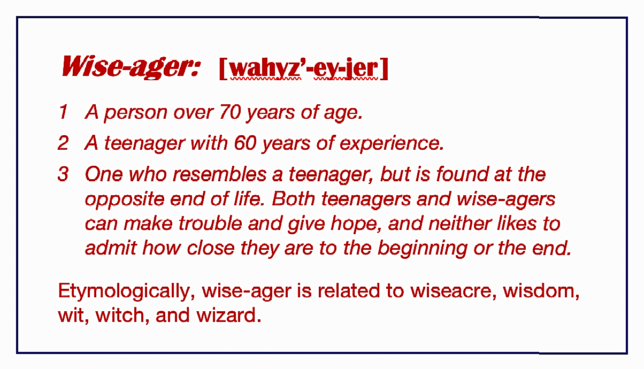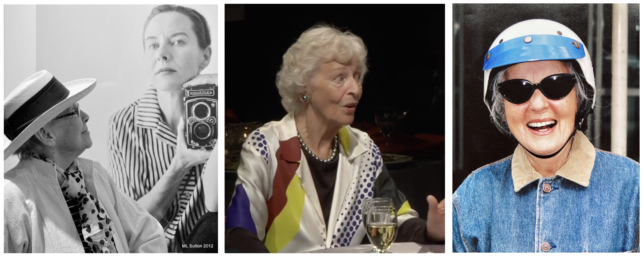How do we refer to ourselves, we who are beyond the traditional age of retirement?

For years, I puzzled and searched for a word or a phrase that felt right – one that’s true enough, easy to say, spirited, and with a splash of irreverence. I don’t at all mind being called “old.” It’s a straightforward description, but I also wanted a choice that did something more.
Most terms don’t fit my image of us. If the terms aren’t boring (senior citizen, mature), they call up an image of a wizened guy at the bar (codger, geezer) when male; or they’re derogatory (hag, battle-axe) when female. Other terms feel pretentious if used in reference to oneself (sage, wisdom-keeper) or are just too sweet (golden-ager).
In a 2011 talk at Town Hall Seattle, Mary Catherine Bateson gave me some of my first solid insights into how to think about this phase of life. Almost everyone after age 50 has some condition, she said, that would have killed them in the past. I can name at least two in my life, more if I count near misses. On average we live 30 years longer today than people did just 100 years ago. The U.S. instituted its retirement plan in 1935 and set the age at 65 when average life expectancy in the United States was 61.7 years.
Today in 2022, for a woman my age (I’m 77), life expectancy rates give me 13 more years – not quite 30 years more than 61.7, but it’s not 2035 yet either. On top of that, many people more or less my age have unprecedented levels of health, energy, time, and resources. We may not have to expect, Bateson stressed, that a long life means “perpetual decrepitude.”
If we’re lucky and live into these extra years, the big question is what are we going to do with the time? Society doesn’t know what to do with us. I’d like to help figure that out, and a new word might help. About five years ago I began calling us “wise-agers,” accent on the first syllable.
I mused on terminology in an earlier essay prompted by memories of a friend, Helen Gurvich, who died at age 88 in 2013. When I saw her one day and exclaimed, “Gee you look great!” Helen was quick to tell me, with a familiar little smirk, that there are three phases in life: youth, middle age, and “Gee you look great!” I immediately started a list of nouns, adjectives, and phrases used to describe us. The list included a comment from a friend: “My mum ‘n dad, both 73, call themselves recycled teenagers.” That seemed about right.
Wise-agers have many-layered decades of experience to stand on. Our extra time allows us to reflect on what we’ve learned, to share it, to mix it up with the energy and smarts of younger people, and to act with whatever wit and stamina our relative good health gives us. Especially given the times we live in, our world needs every source of human energy, knowledge, and action it can get.

Many remarkable people provide inspiration for how wise-ager years can be lived. One is Helen Gurvich, mentioned earlier. Another is Jini Dellaccio, a remarkable woman and photographer who died at age 97 in 2014. She was an exemplary wise-ager. She set her own course and lived a spirited and meaningful life that spanned from playing saxophone in a traveling girl band in her 20s during the Great Depression to learning to use a digital camera in her late 80s.
Yet another is Anne Gerber, a hero and close friend of mine until she died at age 94 in 2005. She was solid proof that we don’t have to choose between art that matters and politics that matter or between a love of nature and a life of ideas. From her too I learned the simple joy of walking on the beach in the rain. She loved to surprise her neighbors with what to most of them were her “puzzling” art choices and her crazy adventures like arriving at the front door of her Horizon House home wearing a helmet and perched on the back of a motor scooter driven by the founder of Monorail Espresso (the world’s first espresso cart, says Wikipedia).
My favorite root of the word wise-ager may be wiseacre. I like the edge of sassiness and eccentricity it carries. Defined as “one who pretends to knowledge and cleverness, an “upstart,” or “smarty pants,” wiseacre was the Merriam-Webster Word of the Day on August 5, 2012. Merriam-Webster says:
Given the spelling and definition of “wiseacre,” you might guess that the word derives from the sense of wise as in “insolent” or “fresh” – the sense that gives us “wisecrack” and “wisenheimer.” But, in fact, “wiseacre” came to English in the 16th century by a different route. It derived from the Middle Dutch “wijssegger,” meaning “soothsayer,” “prophet,” or “seer.”
And “wijssegger,” according to the Oxford Dictionaries, probably came from the Germanic base “wit,” that is, knowledge or to know.
Together, soothsayer, smarty-pants, wit, and knowledge – especially when combined with wisdom and wizard – capture something of the spirit that I admire in all three wise-agers I’ve named. If enough of us start using it, perhaps one day “wise-ager” will make a proper appearance in a legitimate dictionary. Perhaps it can at least sneak in as a footnote.
![]()
Photo credits
• Jini Dellaccio, 2012 photo by ML Sutton, with a self-portrait of Jini from the 1960s.
• A still from “Round Table with Helen Gurvich,” a video by 911 Media Arts Center, 2009.
• Anne Gerber, photo by Chuck Beek, late 1990s.
This essay was first written in 2017 and then revised in 2022.
![]()
Love this Anne, and wise-ager works for me! Great to be reminded of Mary Catherine Bateson’s work. Thank you! Love, L
Nice piece. I think of this wise-ager time as the absolute best time of my life. A reward for having survived youth and adult. Still learning, experiencing, and feeling, and appreciating so much so more than ever.